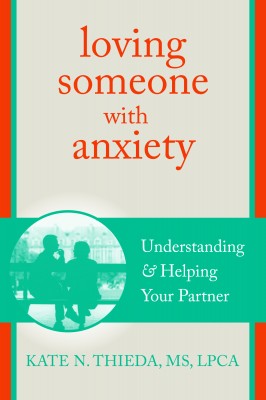 In Loving Someone with Anxiety: Understanding & Helping Your Partner, counselor Kate N. Thieda provides a wealth of accessible insights and practical strategies intended for the audience of a layperson with an anxious partner. However, a reader with an anxious friend, family member or roommate also can benefit from the book’s material. And while Thieda offers information about various anxiety disorders, she emphasizes that one’s anxiety need not qualify as a diagnosable disorder for it to cause distress and strain a relationship.
In Loving Someone with Anxiety: Understanding & Helping Your Partner, counselor Kate N. Thieda provides a wealth of accessible insights and practical strategies intended for the audience of a layperson with an anxious partner. However, a reader with an anxious friend, family member or roommate also can benefit from the book’s material. And while Thieda offers information about various anxiety disorders, she emphasizes that one’s anxiety need not qualify as a diagnosable disorder for it to cause distress and strain a relationship.
The book contains topics including the difference between “everyday” anxiety and anxiety disorders, characteristics of specific anxiety disorders and the risk of comorbid conditions, the ways anxiety affects romantic relationships, practical techniques for communication and relaxation, suggestions for responding to specific types of anxiety, ideas for positive lifestyle changes to reduce anxiety, and self-care strategies for caregivers. Throughout the chapters, Thieda offers frequent vignettes of partners facing challenges and implementing solutions. As accessible as her writing already is, these examples further illuminate the points she makes.
Thieda carries out a number of important tasks in this book. Although she suggests that the reader encourage his or her partner to seek professional help if needed, she also offers clear directions and examples for therapeutic strategies at home, such as helping one’s partner create an anxiety hierarchy and move through it. In doing so, she encourages the reader to hope and empowers him or her to better support a partner. Thieda also explains why accommodating one’s partner’s anxieties (e.g., by carrying out a partner’s OCD rituals, making excuses for him or her, offering constant reassurance) is ultimately more destructive than helpful because it communicates that the anxiety is more powerful than the person who experiences it. In addition to providing information about how to help one’s partner, Thieda prioritizes the mental and emotional state of her reader. She normalizes anxious feelings and discusses the high prevalence of anxiety in our culture; she also validates the unpleasant emotions that often accompany caregiving, such as frustration and guilt. Thieda processes the question of whether and how to tell others about one’s partner’s anxiety, emphasizing a balance of respect for one’s partner with the importance of one’s own self-care and support from others.
Although the book is not specifically meant for mental health professionals, it contains a great deal of information that a counselor can use to communicate more effectively with clients. A counselor might recommend that clients read this book and bring questions back to counseling, or implement some of the strategies Thieda offers, which include empathic listening, mindfulness techniques, body scans and abdominal breathing.
A possible limitation of Loving Someone with Anxiety is that it uses DSM-IV-TR diagnostic criteria for anxiety disorders rather than the new criteria of the DSM-5. For example, one important distinction between editions of the manual is that whereas the DSM-IV-TR characterizes PTSD as an anxiety disorder, the DSM-5 identifies it as a trauma- and stressor-related disorder, a change probably at least partly intended to alleviate the stigma of the term anxiety disorder. A reader of Thieda’s book might miss out on this and similar changes in the diagnostic nomenclature. However, because this book is intended for laypeople and Thieda specifically cautions against a reader using the information she provides to diagnose his or her partner, the use of DSM-IV-TR criteria should not have an impact on the reader.
Loving Someone with Anxiety is a valuable resource for those hoping to support an anxious partner, to gain freedom from anxiety’s restrictions and to engage in healthy self-care, as well as for counselors working with such supportive partners.
Reviewed by: Carie McElveen, the National Board for Certified Counselors, Greensboro, NC.
Thieda, K. N. (2013). Loving someone with anxiety: Understanding & helping your partner. Oakland, CA: New Harbinger.
